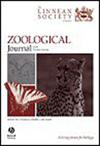Cracking etymological enigmas: unravelling the Greek and Latin languages’ contributions in marine taxa nomenclature
IF 3
2区 生物学
Q1 ZOOLOGY
引用次数: 0
Abstract
Etymology is a key component in zoological nomenclature, often carrying key information for an organism. Greek and Latin languages have been used for centuries in synthesizing zoological names. However, there are surprisingly few studies about each language’s contribution, which is crucial for avoiding misunderstandings around names’ meaning and origin. This study examined the publications that described 1328 valid Echinodermata genera and presents results for 425 genera where etymology was provided by the authors. The analysis showed that 63.8% of genera names were composed exclusively of Greek elements, 28.0% were hybrid, 6.1% ‘other’, and 2.1% Latin. Language elements used in the formation of names were Greek (68.1%), ‘other’ (17.2%), or Latin (14.7%). The contribution of the Greek elements decreased after 1960, while the presence of hybrid increased. A decrease in the contribution of morphological elements was also observed after 1960, accompanied by an increased use of scientists’ surnames. Etymological analysis has unravelled and addressed long-lasting misconceptions about commonly used terminology. The number of studies where etymology is provided increased after 1960; this practice needs to be sustained as etymological transparency advances zoological knowledge and minimizes the risk for the development of misleading concepts in zoological nomenclature.破解词源之谜:揭示希腊语和拉丁语对海洋分类群命名的贡献
词源学是动物学命名法的一个重要组成部分,通常承载着一个生物体的关键信息。几个世纪以来,希腊语和拉丁语一直被用于合成动物名称。然而,令人惊讶的是,关于每种语言贡献的研究很少,这对于避免对名字的意义和起源产生误解至关重要。本研究调查了1328个有效棘皮属的出版物,并给出了作者提供词源的425个属的结果。分析表明,63.8%的属名完全由希腊元素组成,28.0%为杂交元素,6.1%为“其他”元素,2.1%为拉丁元素。用于构成名字的语言元素是希腊语(68.1%),“其他”(17.2%)或拉丁语(14.7%)。1960年以后,希腊元素的贡献减少,而杂交种的存在增加。1960年以后,形态学因素的贡献也有所减少,同时科学家姓氏的使用增加。词源学分析揭示并解决了对常用术语长期存在的误解。1960年以后,提供词源学的研究增加了;这种做法需要持续下去,因为词源学的透明度提高了动物学知识,并最大限度地减少了动物命名法中误导性概念发展的风险。
本文章由计算机程序翻译,如有差异,请以英文原文为准。
求助全文
约1分钟内获得全文
求助全文
来源期刊
CiteScore
6.50
自引率
10.70%
发文量
116
审稿时长
6-12 weeks
期刊介绍:
The Zoological Journal of the Linnean Society publishes papers on systematic and evolutionary zoology and comparative, functional and other studies where relevant to these areas. Studies of extinct as well as living animals are included. Reviews are also published; these may be invited by the Editorial Board, but uninvited reviews may also be considered. The Zoological Journal also has a wide circulation amongst zoologists and although narrowly specialized papers are not excluded, potential authors should bear that readership in mind.

 求助内容:
求助内容: 应助结果提醒方式:
应助结果提醒方式:


